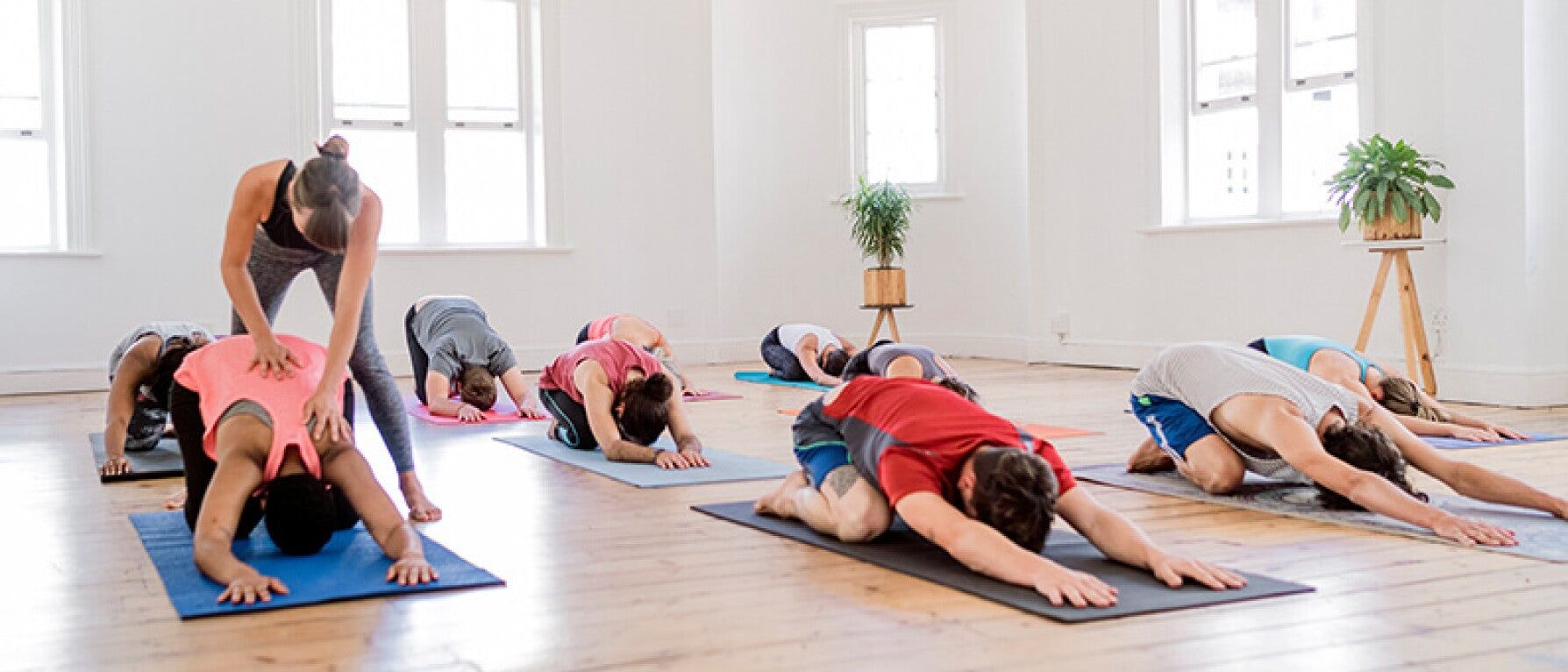It’s early January, and you stroll into the 5:00 p.m. vinyasa yoga class that you cherish because it has just the right number of students (not so small where it feels awkward and not so large where your mat is a finger’s distance away from your neighbor’s mat). You have a favorite spot in the room, and your class has established a solid collective energy. Today, though, there are 25 extra students in the class—many of whom have resolved to start practicing yoga in the new year.
All these aspiring yogis want to change a part of their lives for the better. What a wonderful intention! Why, then, does this crowd dwindle so quickly and why do resolutions seem to come to a screeching halt by late January? It’s simple, really. We are in the habit of approaching New Year’s resolutions with a hunter’s mentality rather than a farmer’s mentality.
Recently, though, you may have begun to understand the benefits of small, incremental change. You may now recognize that you don’t need to change your diet, modify your schedule, begin a new exercise regimen, start a meditation practice, and clean out your entire house and car every January 1. The new year does not need to signify a whole new you. Instead, the new year can be a time to kick off a practice of making small refinements that, over time, enrich your entire life.
One of the very best ways to make resolutions you can keep is to get organized. This doesn’t just mean cleaning out your closet, though this is a great place to start. Tidying up your life means organizing the physical, emotional, and spiritual parts of yourself, so everything is working together as an integrated team.
Getting started can be as easy as establishing and maintaining one or more the following simple habits on a consistent basis. Continue reading to learn tips about how to organize your life this new year.
Love all the parts of yourself equally—the glorious and the challenging, the unique and the mundane, the joyful and the painful. Observe all of it and get curious about what’s truly important to you.
One way to do this is to place a hand over your heart and repeat a mantra that’s meaningful to you. It can be really simple: “I honor the part of myself that likes to discard clothing onto a chair instead of hanging it up after wearing it. I want to understand where this habit is coming from so I can change it and feel more organized.” Honoring where you are can help you take ownership over your habits, behaviors, and feelings. Allow self-compassion to be your trusted tool as you embark on a journey to stay organized and fulfill your resolutions.
The problem is that this is overwhelming to the mind, body, and spirit. All this sudden change feels chaotic and disorienting. Your system needs time to adjust through small, incremental changes. The way to successfully set yourself up for an organized life is to start with small projects and keep your new habits simple and organized.
This means resolving to clean out a smaller space, such as your closet, instead of your entire house. Small changes add up to big results. Don’t be surprised if, over time, you discover that getting one area of your life organized inspires you to declutter and organize other areas of your life. Maybe you schedule time to clean out your closet one weekend and your drawers the next. Over the course of a few months, your house becomes tidy and organized. Perhaps it’s now so light and bright that you can identify a perfect spot to sit and meditate. Now slowly integrating a meditation practice into your life seems like a real possibility.
Let’s say your resolution is to start eating more fruits and vegetables every day. Try something simple and orderly, like swapping out a less healthy afternoon snack with an apple. That’s it. But make a commitment to doing this every day, even if it feels a little strange or you’d rather have a chocolate chip cookie.
Consistency is key, as it will communicate to your brain that you are establishing a new pattern. If you keep this small promise to yourself every single day for about a month, you’ll probably notice it’s become part of your routine and you don’t have to think too much about it. Once this habit is truly integrated into your daily routine, add another small habit.
Opt for a progress tracker that’s bright, warm, and motivating. Then determine the frequency with which you want to track your progress, based on the small goals you’ve established. Does it work better for you to check off a box each day indicating that you meditated for 10 minutes, or would a weekly or monthly tracking system better suit your lifestyle? Consider various ideas and determine what is best for you.
There’s no right or wrong answer. As always, try to take a balanced approach to your tracking and see what enables you to be the most productive. You’ll want to track enough to hold yourself accountable but not so much that it’s causing extra stress.
Maybe you resolved to organize your evening routine so that you can take a walk after dinner, but you had a few nights out to eat dinner with friends and your new habit drifted off into a resolution black hole. This is bound to happen because you’re human.
Getting back on track could be as simple as deciding to re-establish your evening walking routine, lacing up your sneakers, and hitting the street. Great! But perhaps there’s another barrier. For instance, maybe walking in the dark makes you feel unsafe. It might be time to reconsider your resolution so you can stay on track. How about walking after lunch or breakfast instead? Or walking with a friend or neighbor?
Downsizing material objects can be a safe place to start to declutter your life. Clothing, for instance, can follow the one-year rule: If you don’t wear it for a year, it might be time to donate it. Or make the letting go process fun by having a clothing swap with friends and neighbors. You know that cute, one-of-a-kind dress you bought on vacation in Thailand that doesn’t fit quite right and has lots of confusing straps? Toss it into the donation pile.
It feels very cleansing and liberating to let go of material things you’ve been hanging onto. The same goes for establishing good habits. You may resist change with every cell in your body. Even the small stuff can be hard to change. Shake up your routine a little and step out of your comfort zone. If you’ve been doing high lunge in yoga with your back knee down for years, give yourself permission to let go of that pattern and lift your back knee. Notice how it feels. It might be hard but that’s ok. That’s just information. You can do what you want with it.
Now is the time to clean out your house, room, car, mind, body, and heart and rid yourself of clutter. Find ways to organize your space (in a mindful and balanced way) to allow for new people and things and practices that are coming. Make sure you’re welcoming the new with care and compassion.
All these aspiring yogis want to change a part of their lives for the better. What a wonderful intention! Why, then, does this crowd dwindle so quickly and why do resolutions seem to come to a screeching halt by late January? It’s simple, really. We are in the habit of approaching New Year’s resolutions with a hunter’s mentality rather than a farmer’s mentality.
Recently, though, you may have begun to understand the benefits of small, incremental change. You may now recognize that you don’t need to change your diet, modify your schedule, begin a new exercise regimen, start a meditation practice, and clean out your entire house and car every January 1. The new year does not need to signify a whole new you. Instead, the new year can be a time to kick off a practice of making small refinements that, over time, enrich your entire life.
One of the very best ways to make resolutions you can keep is to get organized. This doesn’t just mean cleaning out your closet, though this is a great place to start. Tidying up your life means organizing the physical, emotional, and spiritual parts of yourself, so everything is working together as an integrated team.
Getting started can be as easy as establishing and maintaining one or more the following simple habits on a consistent basis. Continue reading to learn tips about how to organize your life this new year.
1. Honor Where You Are
The new year can serve as a catalyst to integrate a new healthy practice into your life, like organizing your day in such a way that you have time for meditation or breathwork. The first step in making a change that sticks, though, is practicing acceptance and compassion for exactly where you are in the present moment.Love all the parts of yourself equally—the glorious and the challenging, the unique and the mundane, the joyful and the painful. Observe all of it and get curious about what’s truly important to you.
One way to do this is to place a hand over your heart and repeat a mantra that’s meaningful to you. It can be really simple: “I honor the part of myself that likes to discard clothing onto a chair instead of hanging it up after wearing it. I want to understand where this habit is coming from so I can change it and feel more organized.” Honoring where you are can help you take ownership over your habits, behaviors, and feelings. Allow self-compassion to be your trusted tool as you embark on a journey to stay organized and fulfill your resolutions.
2. Start Small
Adopting and integrating a new habit into your life takes time. You may tend to set too many goals for yourself all at once and can become overwhelmed. For example, maybe you join a gym, vow to start eating healthier, and take up meditation every year.The problem is that this is overwhelming to the mind, body, and spirit. All this sudden change feels chaotic and disorienting. Your system needs time to adjust through small, incremental changes. The way to successfully set yourself up for an organized life is to start with small projects and keep your new habits simple and organized.
This means resolving to clean out a smaller space, such as your closet, instead of your entire house. Small changes add up to big results. Don’t be surprised if, over time, you discover that getting one area of your life organized inspires you to declutter and organize other areas of your life. Maybe you schedule time to clean out your closet one weekend and your drawers the next. Over the course of a few months, your house becomes tidy and organized. Perhaps it’s now so light and bright that you can identify a perfect spot to sit and meditate. Now slowly integrating a meditation practice into your life seems like a real possibility.
3. Establish a Routine
In order to develop a healthy habit that you can sustain over the long term, you need to set up a new routine or modify an existing routine, which can be challenging. Your mind may be geared toward the status quo so you may feel resistant to even the slightest of modifications. Start with prioritizing the behaviors or actions that you’d like to integrate into your routine so that you are productive.Let’s say your resolution is to start eating more fruits and vegetables every day. Try something simple and orderly, like swapping out a less healthy afternoon snack with an apple. That’s it. But make a commitment to doing this every day, even if it feels a little strange or you’d rather have a chocolate chip cookie.
Consistency is key, as it will communicate to your brain that you are establishing a new pattern. If you keep this small promise to yourself every single day for about a month, you’ll probably notice it’s become part of your routine and you don’t have to think too much about it. Once this habit is truly integrated into your daily routine, add another small habit.
4. Track Progress
Use a calendar, day planner, to-do list, journal, app, or even the notes on your phone to stay on track and organized. Whatever organizational tool you use to track progress needs to be something you’re inclined to revisit frequently. Details matter in resolutions, and this detail is important in maintaining good time management, too.Opt for a progress tracker that’s bright, warm, and motivating. Then determine the frequency with which you want to track your progress, based on the small goals you’ve established. Does it work better for you to check off a box each day indicating that you meditated for 10 minutes, or would a weekly or monthly tracking system better suit your lifestyle? Consider various ideas and determine what is best for you.
There’s no right or wrong answer. As always, try to take a balanced approach to your tracking and see what enables you to be the most productive. You’ll want to track enough to hold yourself accountable but not so much that it’s causing extra stress.
5. Learn from Setbacks
Resolutions are not known for being easy, and people often become overwhelmed. That’s why so many of them fall through the cracks as the days, weeks, and months fly by each year. Your new journey is likely going to be filled with highs and lows, disappointments and epic wins. When you don’t meet a goal or fall back into an old pattern, that’s an opportunity to learn and grow, and possibly to recalibrate.Maybe you resolved to organize your evening routine so that you can take a walk after dinner, but you had a few nights out to eat dinner with friends and your new habit drifted off into a resolution black hole. This is bound to happen because you’re human.
Getting back on track could be as simple as deciding to re-establish your evening walking routine, lacing up your sneakers, and hitting the street. Great! But perhaps there’s another barrier. For instance, maybe walking in the dark makes you feel unsafe. It might be time to reconsider your resolution so you can stay on track. How about walking after lunch or breakfast instead? Or walking with a friend or neighbor?
6. Give Yourself Permission to Let Go
This applies to behaviors, things, and relationships that are no longer serving you—from the mundane to the extraordinary. Letting go can be an incredibly painful process, so make sure you’re practicing self-compassion and seeking the help of trusted friends and coaches for the big stuff, like letting go of people or jobs. Doing so will provide you with the tools needed to stay organized and establish good habits.Downsizing material objects can be a safe place to start to declutter your life. Clothing, for instance, can follow the one-year rule: If you don’t wear it for a year, it might be time to donate it. Or make the letting go process fun by having a clothing swap with friends and neighbors. You know that cute, one-of-a-kind dress you bought on vacation in Thailand that doesn’t fit quite right and has lots of confusing straps? Toss it into the donation pile.
It feels very cleansing and liberating to let go of material things you’ve been hanging onto. The same goes for establishing good habits. You may resist change with every cell in your body. Even the small stuff can be hard to change. Shake up your routine a little and step out of your comfort zone. If you’ve been doing high lunge in yoga with your back knee down for years, give yourself permission to let go of that pattern and lift your back knee. Notice how it feels. It might be hard but that’s ok. That’s just information. You can do what you want with it.
Now is the time to clean out your house, room, car, mind, body, and heart and rid yourself of clutter. Find ways to organize your space (in a mindful and balanced way) to allow for new people and things and practices that are coming. Make sure you’re welcoming the new with care and compassion.




